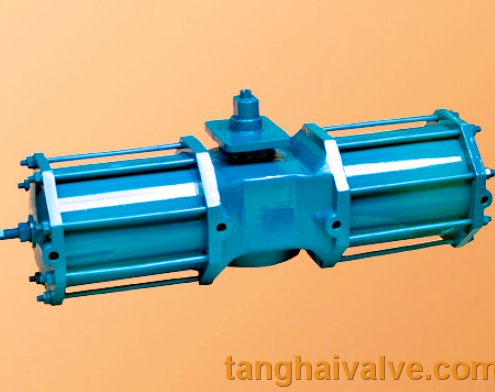Comparison of pneumatic actuator, electric actuator and hydraulic actuator
The valve actuators used in the regulating valve are nothing more than pneumatic, electric and hydraulic:

hydraulic actuator for marine valve
1. Nowadays, most of the actuators used in industrial control places are because they use air source as power, which is more economical than electric and hydraulic, and has a simple structure, which is easy to control and maintain. From a maintenance point of view, it is easier to operate and proofread than other types of actuators, and it is also easy to realize the call of positive and negative on the spot. Its biggest advantage is safety. When using a locator, it is ideal for flammable and explosive environments. If the electrical signal is not explosion-proof or intrinsically safe, there is a potential risk of fire caused by ignition. Therefore, although the application range of electric control valves is becoming wider and wider, in the chemical industry, pneumatic control valves still occupy an absolute advantage.
2. Electric actuators: Electric actuators are mainly used in power plants or nuclear power plants, because the high-pressure water system requires a smooth, stable and slow process. The main advantages of electric actuators are high stability and constant thrust applied by users. The maximum thrust generated by the actuator can be as high as 225000kgf. Only hydraulic actuators can achieve such a large thrust, but the cost of hydraulic actuators is higher than that of electric Much higher. The anti-deviation ability of the electric actuator is very good, and the output thrust moment is basically constant, which can well overcome the unbalanced force of the medium and achieve accurate control of the process parameters, so the control accuracy is higher than that of the pneumatic actuator . If equipped with a servo amplifier, the positive and negative effects can be exchanged easily, and the signal-off valve position state (hold/full open/full close) can be easily set, and it must remain in the original position when it fails. What the pneumatic actuator cannot do, the pneumatic actuator must rely on a set of combined protection system to achieve position retention.
Hydraulic actuator: When we need abnormal anti-deflection ability, high thrust and fast formation speed, we often choose hydraulic or electro-hydraulic actuator. Because of the incompressibility of hydraulics, the advantage of using hydraulic actuators is better anti-deviation ability, which is very important for regulating conditions, because when the regulating element is close to the valve seat, the throttle condition is unstable. The larger the pressure difference, the worse this situation is. In addition, the hydraulic actuator runs very smoothly and responds quickly, so high-precision control can be achieved. The electro-hydraulic actuator integrates the motor, the oil pump, and the electro-hydraulic servo valve. It can work as long as it is connected to the power supply and the control signal. The hydraulic actuator is similar to the cylinder, but it can withstand higher pressure than the cylinder. Work requires an external hydraulic system. The factory needs to be equipped with hydraulic stations and oil pipelines. In contrast, electro-hydraulic actuators are more convenient.



 © Copyright 2020 Tianjin Tanghaidongyang Valve Co., Ltd. All Rights Reserved.
© Copyright 2020 Tianjin Tanghaidongyang Valve Co., Ltd. All Rights Reserved.